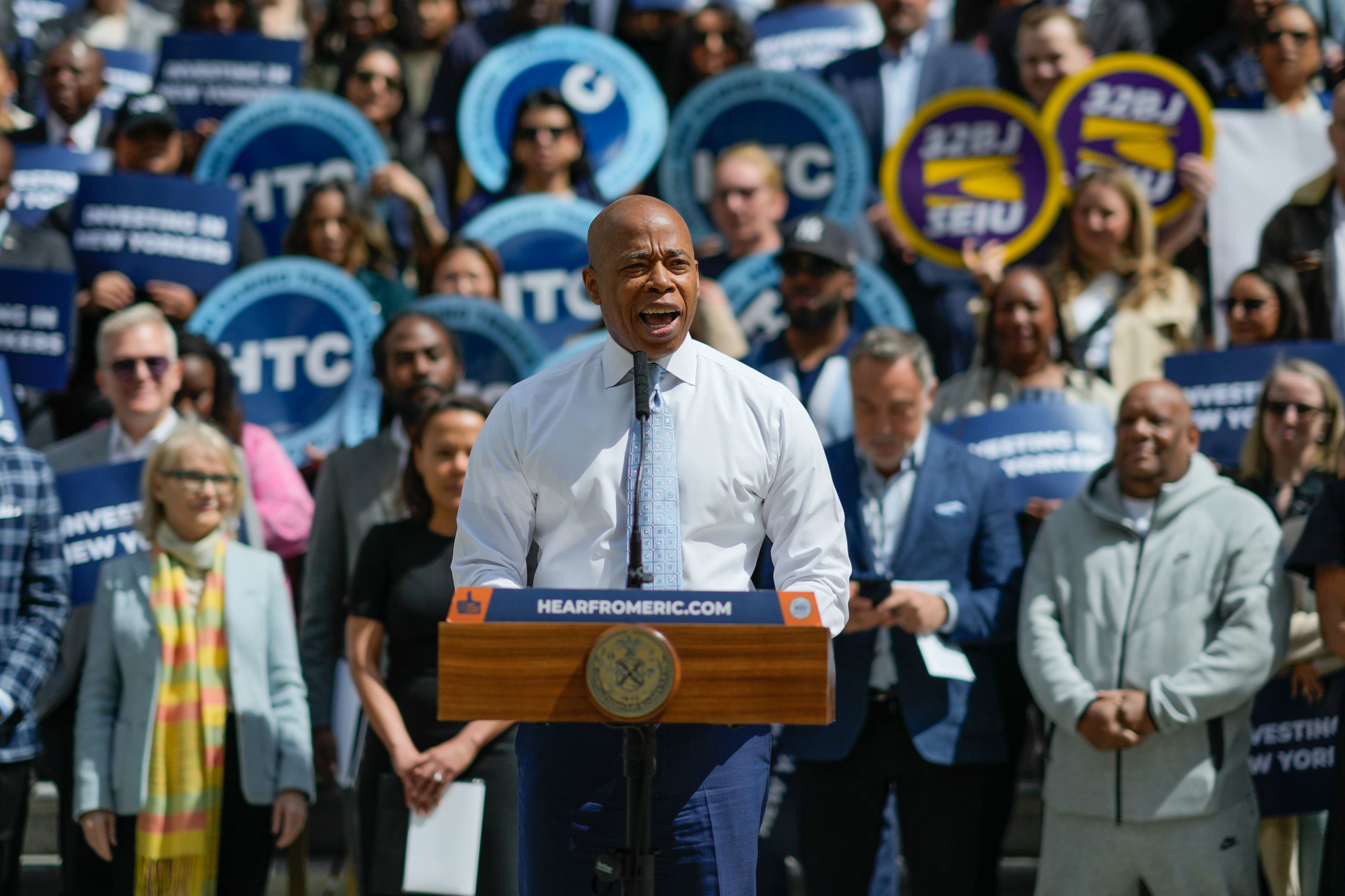Sign up for Chalkbeat New York’s free daily newsletter to keep up with NYC’s public schools.
New York City public schools would see its budget shrink by 2.4%, or $808 million, next fiscal year under a more detailed budget presented by Mayor Eric Adams on Wednesday.
The smaller budget is largely the result of expiring federal relief dollars, and Adams’ proposal saves a slew of programs that were on the chopping block because they were financed with one-time money that flooded into city coffers in the wake of the pandemic.
Officials announced last week that they will use more than $500 million in city and state funds to keep hundreds of social workers, new staffers working in homeless shelters, and an expansion of preschool for 3-year-olds, among other initiatives.
“We inherited fiscal cliffs,” Adams said during a rally outside City Hall on Wednesday. “We had to continue to fund these programs in a real way.”
Overall, the city’s contribution to the Education Department’s budget would rise by nearly $1.6 billion under Adams’ proposal, though not enough to completely offset the $2.4 billion drop in federal funding next year. The state’s contribution is set to increase by $202 million. The mayor’s proposed operating budget for the department is $32.2 billion.
Advocates and City Council leaders have praised Adams’ efforts to find funding for programs that were operated with one-time money. But he has also faced criticism over the past year for ordering sweeping cuts to city agencies to help finance services for an influx of migrants.
Those reductions have not been fully reversed, and the Education Department faces over $700 million in cuts next year under that directive, including $170 million less for early childhood programs and the elimination of vacant non-classroom positions.
Adams’ budget replaces expiring 3-K funding, but advocates say it’s not enough
Adams has faced significant blowback for scaling back the city’s ambitious plan to offer universal free preschool programs for 3-year-olds, also known as 3-K, a promise made by Mayor Bill de Blasio and financed with the one-time federal dollars.
Adam’s budget replaces $92 million of expiring federal funding for 3-K, but does not restore the broader $170 million cut in city funding for preschool programs. Schools Chancellor David Banks said during a City Council hearing last month that those cuts are “extremely hurtful to the entire enterprise of early childhood” and predicted that they would be restored.
But even without replacing those early childhood cuts, Adams insisted on Wednesday that every family who wants a 3-K seat will have access to one. Officials are now planning to spend $5 million on outreach efforts to get the word out about the program, though Adams previously argued that vacant slots suggested the program needed to be “right-sized.”
“How do you have 23,000 vacant pre-K, 3-K, seats and we see that as a great program?” Adams said. “No. A great program is when we place those babies in those seats.”
Early childhood advocates were skeptical that the mayor’s efforts would be enough to guarantee every child a seat. They pointed out that the $92 million commitment to replace federal funding for 3-K expansion is for one year only, though city officials said they’re looking for longer-term funding sources.
“Without further investments in the child care system, the City will not be able to fulfill the Mayor’s crucial promise,” Gregory Brender, the chief policy and innovation officer at the Day Care Council, wrote in a statement. “The Executive Budget remains a perilous proposal for New York City’s early childhood education system.”
Advocates also pointed out that the city has only partially replaced federal funding that Adams used to bolster special education preschool programs, even as officials acknowledged last month that hundreds of students with disabilities don’t have access to seats to which they’re legally entitled.
The Education Department’s budget could still change
The mayor’s budget is still subject to negotiations with the City Council, which must pass a final budget by July 1.
Advocates and local lawmakers are pushing for Adams to fund a handful of other initiatives whose funding is not guaranteed after this year.
Those include restorative justice initiatives that encourage peer mediation and other methods of resolving conflicts to reduce punitive methods like suspensions; a mental health program for students at 50 high-need high schools; and a program that offers subsidized child care for undocumented families. City Council officials also pointed to the need for more funding for school building upgrades, as fewer than 1 in 3 of the city’s schools are fully accessible to people with physical disabilities.
“We are relieved that many of the education programs supported with federal stimulus funding are no longer in jeopardy,” Kim Sweet, executive director of Advocates for Children, an organization that works on behalf of low-income families, wrote in a statement. “We urge City leaders to go further to prevent the loss of other critical supports that students and families need.”
Alex Zimmerman is a reporter for Chalkbeat New York, covering NYC public schools. Contact Alex at azimmerman@chalkbeat.org.






